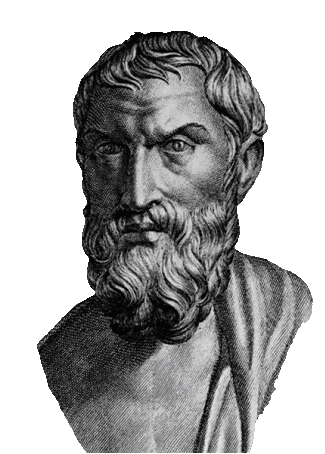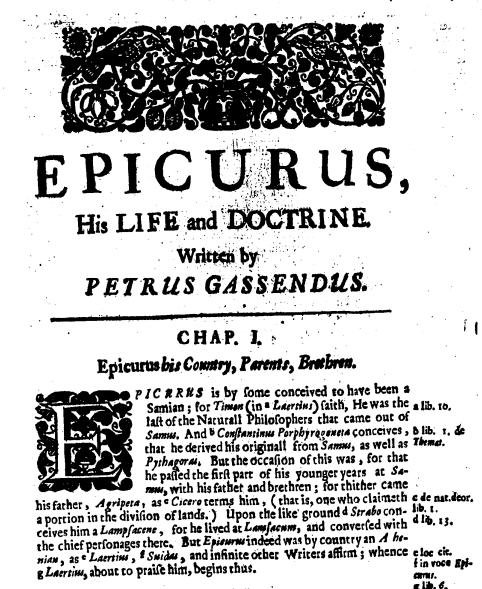Peace and Safety For Your Twentieth of December! Today, A Passage from Gassendi on Felicity in Epicureanism
 Peace and Safety to the Epicureans of today, no matter where you might be! On this Twentieth of December, in the midst of a holiday season in much of the world, let’s consider a passage on Felicity from page 226 of Thomas Stanley’s History of Philosophy, Volume III:
Peace and Safety to the Epicureans of today, no matter where you might be! On this Twentieth of December, in the midst of a holiday season in much of the world, let’s consider a passage on Felicity from page 226 of Thomas Stanley’s History of Philosophy, Volume III:
For the end of life by the tacit consent of all men, is Felicity; and since almost all miss to that end, must it not happen either for that they propose not to themselves that felicity which they ought, or that they use not the right means to attain it?
When we behold so many, who, abounding in all things necessary to the use of life (swimming in wealth, adorn’d with titles, flourishing in a hopefull issue; in fine, possessed of all things commonly esteemed desirable) are not withstanding anxious and querulous, full of cares and solicitudes, distracted with terrours, in a word, leading a miserable life; thence we may inferre that they know not wherein true felicity consists, and by what means it may be attained; their hearts resembling a vessell, which either being leaky and full of holes, can never be filled; or being tainted with ill liquor, corrrupts and spoyles whatsoever it receives.
It is therefore worth our paines, by the benefit of this Philosophy (which treats of the End and of Felicity) to cleanse and mend our heart, that it may be satisified with a little, and be pleased in the enjoying of any thing, we must Philosophize nor for show but seriously; for it is requisite not that we seem sound, but that we be sound: We must philosophize forthwith, and not deferre it to the morrow; for even today it concerns us to live happily, and it is a michief of folly that it always begins to live, or defers to begin, but in the mean time liveth never.
A strange thing it is! We have been borne once, we cannot be borne twice, and age must have an end; Yet Thou O Man, though the morrow be not in thy power, in confidence of living tomorrow, put’st thy self off to the future, and loosest the present: So mens lives waste with delay, and hence it is that some of us dye in the midst of business; Every man leaves the World as if he had but newly entered it; and therefore old men are upbraided with infancy, because, as if employed in a business that concerns them not, they do not take notice that they live, and so their whole life passeth away with the benefit of life.
Let us therefore endeavour so to live that we may not repent of the time past; and so enjoy the present, as if the morrow nothing concerned us. He most sweetly attains the morrow who least needs or desires the morrow; and that hour overtakes a man most welcome, whereof he had framed to himself the least hope. And since it is troublesome always to begin life, let life be alwayes to us as it were perfect and absolute, and ias if there wanted nothing to its measure. The life of a fool is unpleasant, it is timorous, it is wholly carried on in the future; let us endeavor that ours be pleasant, secure, not only present, but even now settled in safety.
Doubtlesse, the way to fly folly is to ascend that watch-tower (as it were) of wise men, from whence we may behold the rest wandering, and, in life, vainely seeking life. If you think it is pleasant from Land to behold Mariners striving with storms, or, without endangering your self, see Armies joyning battell; certainly, nothing can be more delightfull than from the calm throne of Wisdome to view the tumults and contentions of fools. Not that it is pleasant that others be afflicted; but it pleaseth, that we are not involved in the same evills.
But that we may in some measure, to our ability, help those who desire to attain this height of wisdom, we will collect our meditations upon these things, treating first of Felicity, which is man’s greatest good, and then of those things which conduce to the making and preserving of it, which are nothing else but the Virtues themselves.
_____________
As Seneca recorded: Sic fac omnia tamquam spectet Epicurus! So do all things as though watching were Epicurus!
And as Philodemus wrote: “I will be faithful to Epicurus, according to whom it has been my choice to live.“

